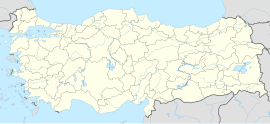The Haji Bektash Veli complex (Turkish: Hacıbektaş Külliyesi) is an Alevi Islamic Cultural Monument of the Republic of Turkey, located in Hacıbektaş, Nevşehir province. It was built in the 13th century as a teqe (dergâh) of the Sufi saint Haji Bektash Veli. After his death, his mausoleum was built here.
Hacı Bektaş Veli külliyesi | |
 | |
| Location | Hacıbektaş, Nevşehir Province, Turkey |
|---|---|
| Coordinates | 38°56′N 34°33′E / 38.933°N 34.550°E |
| Type | Religious complex |
| History | |
| Periods | Seljuks of Anatolia |
Before the secularization of Turkey in 1925, the complex was home to the pir evi ("pir's house") of Haji Bektash Veli, which served as the international headquarters of the Bektashi Order.[1]
Secularization
editAtatürk's 1925 ban on all dervish orders caused the exodus of the Bektashi Order to Albania in 1925, and the complex was closed for religious use. As a result, the administrative seat of the Bektashi Order was shifted to the World Headquarters of the Bektashi in Tirana, Albania in 1930. The Haji Bektash Veli complex was later declared as museum in 1964. The teqe of the complex is thought to be the first "King type" teqe in Turkey.
Tourism
editNowadays, the Haji Bektash Veli Complex is visited by hundreds of thousands of Alevis, Bektashis, and even Sunni Muslims from Turkey, Albania, and the Turkish diaspora in Europe and around the world. Large festivals are held here every August. Since 2012, the Haji Bektash Veli complex is on the World Heritage Sites Tentative list of the UNESCO.
Gallery
edit-
Haji Bektash Veli Complex
-
Haji Bektash Veli Complex
External links
editReferences
edit- ^ Elsie, Robert (2019). The Albanian Bektashi: history and culture of a Dervish order in the Balkans. London: I.B. Tauris. ISBN 978-1-78831-569-2. OCLC 1108619669.
